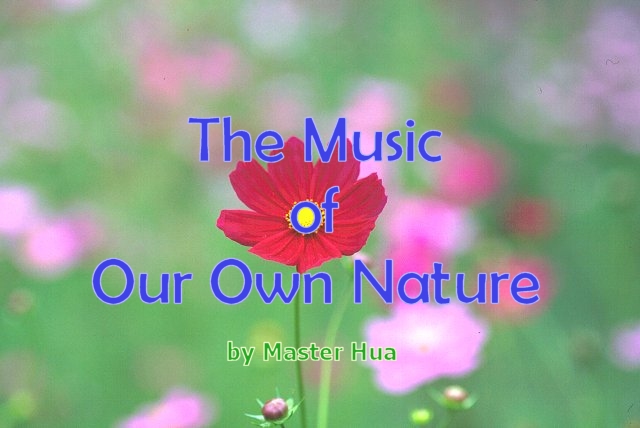
|
 |
|
It's only because we're not
peaceful and serene All Chinese characters have their own meaning. Characters are created according to certain rules. Each character's formation has an explanation. Chinese characters are classified into six types according to their forms: (1) the form resembles the object (pictographs) (2) the form indicates the meaning; (3) the components suggest the meaning; (4) the form reflects the sound; (5) it has various pronunciations and meanings; and (6) the form is borrowed only for its sound. Some examples of pictographs are the character
As for music, Buddhist chants and recitations are also a kind of music. When we hit the wooden fish with the right rhythm, there is merit and virtue in it. If we hit the wooden fish with a bad temper, or hit it too loudly or too softly, we create offences. When we sing praises, we are making a musical offering to the Buddhas. If we make offerings to the Buddhas on the one hand and lose our temper on the other, do you think the Buddhas will be happy? Making a musical offering to the Buddhas is basically a meritorious deed, but if you get angry and sing poorly and play the Dharma instruments sloppily, then you're creating offences. Cultivation should be a part of everything we do. There is no place that is not a place for cultivation. Cultivation is not limited to meditation or bowing to the Buddha. Eating, putting on clothes, and every single deed and activity we do is cultivation. Cultivation involves regulating the body and mind. We regulate the body to keep it healthy and free from sickness. But that doesn't mean pampering and spoiling the body until it can't take the slightest cold, heat, thirst, or hunger. We should rigorously discipline our body, as long as we don't hurt it. We shouldn't treat our body as if it were a fragile piece of glass that can't be touched. Cultivation means disciplining and training ourselves in our daily lives. Whether we are moving or still, awake or asleep, there should never be a moment when we are not cultivating.
At that point, the six arts--rites, music, archery, charioteering, calligraphy, and mathematics--are all found within our nature. If we refrain from useless chatter and meaningless, discursive thoughts, so that our minds are calm and steady, with no hangups or worries, no discriminations between self and others or between right and wrong, what could that be, if not music? When Confucius heard the music of Shao while he was in the state of Qi, he was so enchanted that he couldn't taste the flavour of meat for three months. If you understand the music of your own nature, then not to mention meat, you won't even know what water tastes like, nor will you taste the flavours of sour, sweet, bitter, or hot. At that time, you will "look without seeing, hear without listening, and eat without tasting your food." Please pay attention to this. Do not treat your own nature as a battleground on which to fight, for that wouldn't be music! A talk given on July 16, 1985 |
 There
are also six arts: rites, music, archery, charioteering, calligraphy,
and mathematics. Among Confucius' three thousand disciples, only seventy-two
had mastered all six. Rites are ceremonial rituals; archery includes
martial arts; charioteering referred to driving chariots in ancient
times, but now can be expanded to include driving automobiles, piloting
airplanes, steering ships, and so forth; there are generally five styles
of calligraphy: seal, square or plain, regular, correspondence, and
running-hand. As for mathematics, there is a saying that goes, "One
should understand some mathematics and be acquainted with some literature."
Modem rockets and missiles were invented according to mathematical principles.
For example, the computers con- trolling the flight of a rocket operate
according to mathematical principles.
There
are also six arts: rites, music, archery, charioteering, calligraphy,
and mathematics. Among Confucius' three thousand disciples, only seventy-two
had mastered all six. Rites are ceremonial rituals; archery includes
martial arts; charioteering referred to driving chariots in ancient
times, but now can be expanded to include driving automobiles, piloting
airplanes, steering ships, and so forth; there are generally five styles
of calligraphy: seal, square or plain, regular, correspondence, and
running-hand. As for mathematics, there is a saying that goes, "One
should understand some mathematics and be acquainted with some literature."
Modem rockets and missiles were invented according to mathematical principles.
For example, the computers con- trolling the flight of a rocket operate
according to mathematical principles. Cultivation
doesn't just mean doing morning and evening recitations. In our every
move, in everything we say and do, we should accord with the rhythm
and rules, for we each have our own music in our inherent nature. We
should cultivate a peaceful serenity, devoid of afflictions, discriminations
between self and others, and ignorance. If we envy others' talents,
wish to accomplish great things without laying the groundwork, or always
try to get into the spotlight and become famous, we are not making music.
Music comes from practicing the Dharma every day. If we can regulate
ourselves so that we are always peaceful, serene, and mellow, then we
need not seek outside for music. It's only because we're not peaceful
and serene that we need external music to balance ourselves. When our
minds are peaceful, serene, and always in harmony, we are experiencing
true music.
Cultivation
doesn't just mean doing morning and evening recitations. In our every
move, in everything we say and do, we should accord with the rhythm
and rules, for we each have our own music in our inherent nature. We
should cultivate a peaceful serenity, devoid of afflictions, discriminations
between self and others, and ignorance. If we envy others' talents,
wish to accomplish great things without laying the groundwork, or always
try to get into the spotlight and become famous, we are not making music.
Music comes from practicing the Dharma every day. If we can regulate
ourselves so that we are always peaceful, serene, and mellow, then we
need not seek outside for music. It's only because we're not peaceful
and serene that we need external music to balance ourselves. When our
minds are peaceful, serene, and always in harmony, we are experiencing
true music.